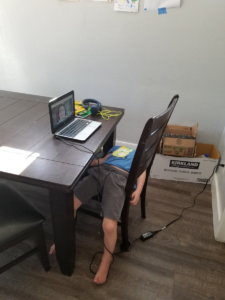 According to Jeremy N. Bailenson in Nonverbal Overload: A Theoretical Argument for the Causes of Zoom Fatigue, there are four main source of ‘Zoom Fatigue’:
According to Jeremy N. Bailenson in Nonverbal Overload: A Theoretical Argument for the Causes of Zoom Fatigue, there are four main source of ‘Zoom Fatigue’:
- Excessive amounts of close-up eye contact is highly intense.
- Seeing yourself during video chats constantly in real-time is fatiguing.
- Video chats dramatically reduce our usual mobility.
- The cognitive load is much higher in video chats.
But Zoom, they argue, could make design changes to fix or ameliorate these:
[M]any of these problems could be solved with trivial changes to the design of the Zoom interface. For example, the default setting should be hiding the self-window instead of showing it, or at least hiding it automatically after a few seconds once users know they are framed properly. Likewise, there can simply be a limit to how large Zoom displays any given head; this problem is simple technologically given they have already figured out how to detect the outline of the head with the virtual background feature. Outside of software, people can also solve the problems outlined above with changes in hardware and culture. Use an external webcam and external keyboard that allows more flexibility and control over various seating arrangements. Make “audio only” Zoom meetings the default, or better yet, insist on taking some calls via telephone to free your body from the frustrum.
What I like best about all this is the suggestion that I’ll do better as a Zoom listener if I do other things while listening from time to time. Depending what the other thing is, it might be right. But it’s so Millennial!

I’ve all along found that doing other things during Zoom calls really helps, generally mindless things. (eg, looking up Wayback links to replace expired links on pages on my website). I find it helpful not to stare at the window, though seeing myself doesn’t bother me (in fact, I find I dislike Google Meet becasue of the way it makes my window tiny and places it outside the main display). So I agree with most of that advice. Although, I have to say, if you’re the one presenting, having everyone looking off into the distance is not as helpful as having them looking toward you and reacting to what you’re doing.
wg